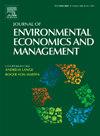稀缺性,为物种买单的意愿,以及市场商品的不完全可替代性
IF 5.9
3区 经济学
Q1 BUSINESS
Journal of Environmental Economics and Management
Pub Date : 2025-06-03
DOI:10.1016/j.jeem.2025.103192
引用次数: 0
摘要
生物多样性丧失对人类福祉的影响取决于我们对自然利益的重视程度以及市场上这些利益的替代品存在的程度。缺乏环境产品和服务的市场,加上社会环境系统的非线性和不可逆性,为理解生物多样性丧失的后果提出了独特的挑战。我们使用定量好的框架来探讨物种稀缺性如何影响物种的边际WTP及其收入弹性。我们注意到边际WTP不一定会减少物种丰度,甚至可能会增加,特别是如果相关的一系列利益通过减少防御支出而有助于实际收入。利用物种丰度和物种水平WTP估算数据,我们验证了物种丰度将影响边际WTP及其收入弹性的预测。我们对WTP收入弹性的点估计(η=0.44 - 0.51)在模型规格范围内是稳定的。在同质偏好的假设下,该值表明我们数据集中的物种通常与市场商品具有弱可替代性(σ=1.96−2.27);然而,物种与市场商品之间的互补性随着物种威胁程度的增加而增加:对于极度濒危物种,η=1.13, σ=0.88。观察到的关系不能通过许多驱动政策制定的模型中使用的实用功能形式来捕获。本文章由计算机程序翻译,如有差异,请以英文原文为准。
Scarcity, willingness to pay for species, and imperfect substitutability with market goods
The impacts of biodiversity loss on human well-being depend on how much we value benefits from nature and the extent to which substitutes exist in the market for these benefits. The lack of markets for environmental goods and services, coupled with non-linearities and irreversibility in socio-environmental systems, presents unique challenges for understanding the consequences of biodiversity loss. We use a rationed-good framework to explore how species scarcity impacts marginal WTP for species and its income elasticity. We note that marginal WTP need not be decreasing in species abundance and may even be increasing, particularly if the associated suite of benefits contributes to real income via reductions in defensive expenditures. Using a new dataset of species abundance and species-level WTP estimates, we test our predictions that species abundance will impact marginal WTP and its income elasticity. Our point estimates of the income elasticity of WTP () are stable across a range of model specifications. Under the assumption of homothetic preferences, this value suggests that the species in our dataset are generally weakly substitutable with market goods (); however, we show that complementarity between species and market goods increases as the species’ level of threat increases: , for critically endangered species. The observed relationships cannot be captured by the functional forms for utility used in many models driving policymaking.
求助全文
通过发布文献求助,成功后即可免费获取论文全文。
去求助
来源期刊
CiteScore
8.00
自引率
4.30%
发文量
91
期刊介绍:
The Journal of Environmental Economics and Management publishes theoretical and empirical papers devoted to specific natural resources and environmental issues. For consideration, papers should (1) contain a substantial element embodying the linkage between economic systems and environmental and natural resources systems or (2) be of substantial importance in understanding the management and/or social control of the economy in its relations with the natural environment. Although the general orientation of the journal is toward economics, interdisciplinary papers by researchers in other fields of interest to resource and environmental economists will be welcomed.

 求助内容:
求助内容: 应助结果提醒方式:
应助结果提醒方式:


